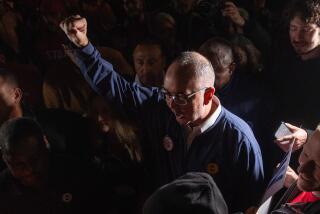U.S. Court Voids a UAW Election, Orders New One : ‘Irregularities’ in Vote for Executive Board Post Cited
For the first time in its 53-year history, the United Auto Workers union has been ordered by a federal judge to hold a new election for one of the 22 seats on its international executive board.
District Court Judge Richard F. Suhrheinrich of Detroit, acting in response to a lawsuit filed by the U.S. Labor Department, late Monday voided the results of a June 4, 1986, election for director of the UAW’s southwest region.
Suhrheinrich said there was a “substantial use of union facilities” and $13,000 of union funds spent to support the candidacy of incumbent Kenneth Worley, in violation of federal labor law. He also cited “irregularities” in the way notice was given to some union members about elections for delegates to the UAW convention.
Worley defeated challenger Jerry Tucker by less than two-tenths of a vote in the closest election in UAW history. The following day, Tucker asserted at the Anaheim Convention Center, site of that year’s UAW convention, that the election had been stolen from him. He said that nearly 27 votes had been cast by illegally chosen delegates and that the international union had improperly aided Worley in a variety of ways.
Could Take 5 Months
The union delayed certifying the results for one day, but then approved them. Later in the year, the Labor Department filed two suits challenging the conduct of the election, leading to Suhrheinrich’s ruling Monday. The judge said he would issue a formal written opinion in two weeks.
Peter Laarman, the UAW’s public relations director, said the union would “comply fully with whatever the judge orders.”
After Suhrheinrich issues his opinion, it could take three to five months for the new election to be completed, according to Richard Hunsucker, director of the Labor Department’s office of Elections, Trusteeships and International Union Audits. Suhrheinrich indicated that he first would require the union to hold new elections for delegates in all 68 locals in the region. The St. Louis-based southwest region, called Region 5, is the largest geographically in the union, spanning eight states from Colorado to Louisiana.
Hunsucker said he assumed that after the local elections are held, delegates would come together to choose a regional director at a regional convention. He said the Labor Department would supervise both the local elections and the regional convention vote.
“It’s a victory for the people in Region 5 who’ve had to operate without a legally elected director for 21 months,” said Tucker, the former assistant regional director under Worley.
Tucker was fired by UAW president Owen Bieber when he declared his candidacy in May, 1986. Bieber cited a union rule providing that no staff member can challenge an incumbent regional director without giving at least 90 days’ notice and taking an unpaid leave of absence.
Tucker and the Labor Department have filed separate suits contending that the rule, adopted by the UAW’s administration caucus in 1973, is illegal and violates the UAW constitution. UAW officials maintain that the rule is necessary to avoid disruption in the union. Suhrheinrich issued no decision on those cases Monday.
Delegates Got Jackets
Tucker, 49, is the leader of a dissident movement in the union called New Directions. The group contends that top union leadership does not pay enough attention to rank and file workers, has not devoted adequate resources to organizing and has become cooperative with some corporations to the extent that it is detrimental to members.
The $13,000 in UAW funds Suhrheinrich cited in his ruling was used by Worley to buy jackets for delegates to the convention. The jackets bore his name and the region’s number. Other appeals court decisions have held that elections were tainted by the use of as little as $6.80 in union money or the use of a union photocopying machine for a candidate’s campaign literature.
More to Read
Sign up for Essential California
The most important California stories and recommendations in your inbox every morning.
You may occasionally receive promotional content from the Los Angeles Times.










